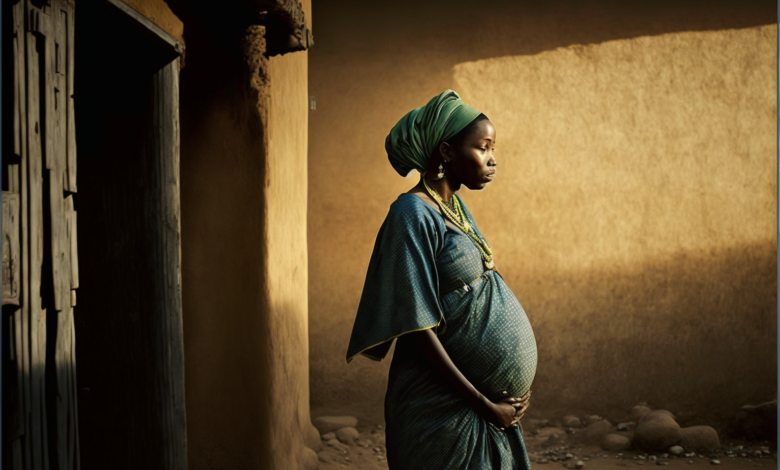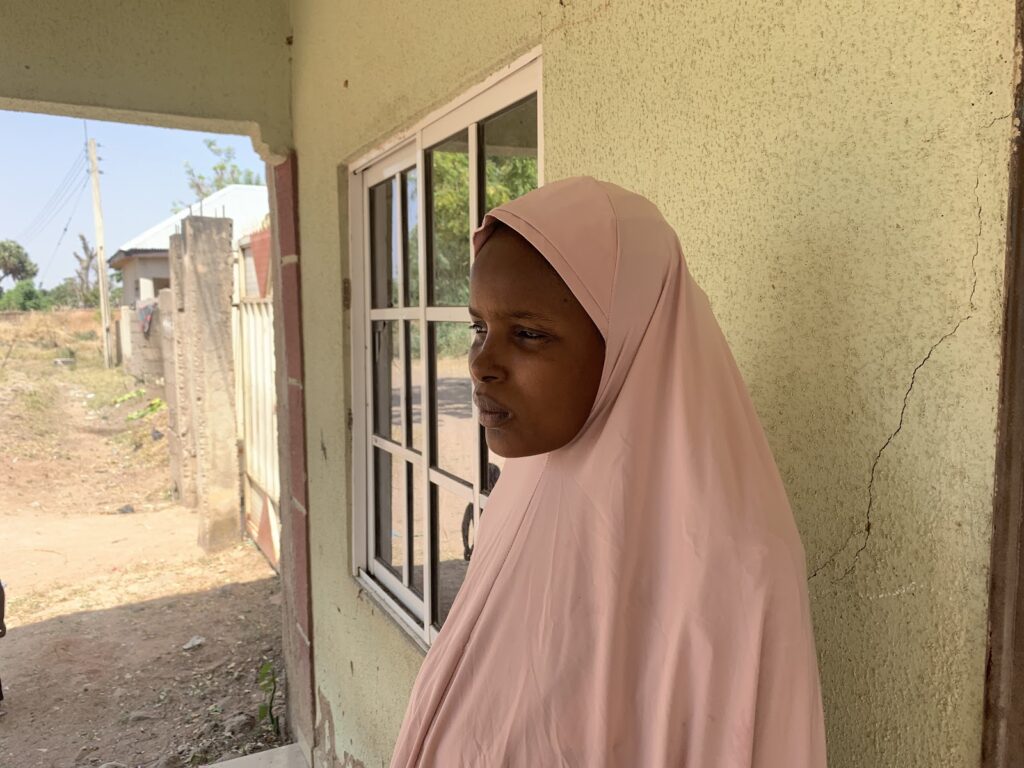Pregnant And Left Behind
Women in Adamawa’s Mayo-Balwa community in Northeast Nigeria narrate their experience with childbirth and pregnancy when their husbands leave home to find work miles away due to a migratory practice known as ‘Ci Rani’.

The first time Hadizatu went into labour with her first child, Umar, her husband, was present.
A vehicle had been arranged to take her to the hospital, and when she returned home with her newborn, there was food in abundance, there was Umar, and there were other family members who made her transition into motherhood smooth.
The next time Hadizatu would go into labour with her second child, none of the above support would be readily available.
What differentiates these outcomes lie solely on the time of the year Hadizatu’s second child arrived as Umar had already migrated hundreds of miles away from his family to find work.
Left behind
Hadizatu, 22, limps towards this reporter clad in a yellow khimar (head covering garment). Her second baby arrived five days prior to the interview. Although a soft smile is fixed on her face, Hadizatu looks weary and worn out.
“He is in Lagos [state],” she timidly replies in Fulfulde when asked about her husband. She hesitates a bit before adding that he had not returned or been in touch since the birth of their second child.
For decades, men in certain communities in rural northern Nigeria have engaged in an internal migration tradition that does not include their families. This type of migration, known as Ci Rani in Hausa, is usually done by rural dwellers, especially farmers and herders, who leave their homes for cities.
The movement often takes place during the dry season and farming activities draw back before another rainy season commences. Most farmers, in a bid to keep themselves occupied, move to cities in the southern region of the country and take up odd jobs.
Umar is one of such farmers in Mayo-Balwa, a Local Government Area in the northeastern state of Adamawa, who engages in Ci Rani. Hadizatu, his wife of three years, explains that he usually leaves home every October to return in May when the rains start.
While this move away from home is done with the intent of providing sustenance for the family back home, it is very common for the matriarchs of the household to complain of hunger, lack of support, and a compromised way of living until their husbands return.
But this reporter noticed subtle nuances to how women responded to the phenomena of migrant husbands especially with regards to their community.
When HumAngle spoke to displaced women in Girei LGA, also in Adamawa, whose husbands had moved to other states to benefit from a better economic outcome, left-behind wives were more open and straightforward about their dissatisfaction and how, asides being burdened with child care and other domestic responsibilities, they had to also find work within their communities to sustain themselves when their husbands were inaccessible.
In Mayo-Balwa on the other hand, women were more discreet about their struggles. They also did not find work within their communities and deprived themselves of assistance from their families and other community members. Aliyu Gengle, our fixer, who lives in the same community as Hadizatu, had to give more context to Hadizatu’s ordeal as she remained tight-lipped about her own situation.
According to Aliyu, Umar’s father is a prominent man in the community and had warned Umar not to leave his pregnant wife but he did anyway. “It was three days after he had left that his father knew,” our fixer explains, “the father visited Hadizatu and asked her if she knew her husband had migrated, to which she said she knew. He was really angry that she had not said anything.”
In October, when Umar moved, he left only the sum of N5,000 and has not sent anything home since. Our fixer explained that left-behind wives in Mayo-Balwa would rather not speak up about the unpleasant experience of not having the head of the house around because migrating to find alternative work is viewed as an act of ‘manly courage’.
‘Pregnancy is tough but it’s tougher without my husband’
Aisha’s bulging stomach precedes her as she walks. She is in her third trimester of pregnancy and is expecting to deliver her third baby in the month of February. While she narrates being gripped by the general uncertainty of childbirth, she admits being more afraid of doing it without her husband providing the necessary support.
“Getting him on the phone is very difficult and that is my biggest problem,” she says. “Sometimes when I don’t feel well and I want to tell him, he is unreachable and that scares me a lot.”
Aisha’s husband farms beans, groundnuts, and maize in Mayo-Balwa LGA during the rainy season, and migrates to Imo, a state in the southeast region that is approximately 750 kilometres away, during the dry season yearly.
They have been married since she was 13 years old, she says, narrating how things were relatively easier when she had only herself to worry about and did not have to take care of their children all by herself. “I used to also have time to buy and sell when it was just me but now we have two children that look up to me for everything when their father is away and another child is on the way,” she explains.
Since Aisha’s husband moved to Imo in September, she said he only sent N10,000, “and he knows I am close to giving birth, but he did not send some extra money that will help when I give birth.
“Pregnancy is tough for me even when he is around because it comes with a lot of stress and I frequently fall sick, but without him it is tougher. I get scared that something might happen to me or our baby even though I am always praying that I deliver safely.”

Seven out of 36 states in Nigeria have over two-fifths of their total population being internal migrants. One study revealed that Abia, Ekiti, Delta, Imo, Anambra, Bayelsa, and Lagos states, all in the southern region, have the most in-migrants, with the majority of them flowing from the northern part of the country.
There is a push and pull factor that drives people out of a region to another region, Omoja Godfrey, a population migration researcher, notes. He states that there is a general outflow of rural dwellers from the northern part of Nigeria due to rising insecurity. But regarding farmers migrating during the annual dry season, “it is purely for economic gains,” he says.
The paper, which referenced the 2010 Internal Migration Survey conducted by the National Population Commission (NPC), noted that there had been a relative shift in the position of Lagos state, in the southwest, as number one in in-migration as of 1998, giving rise to the emergence of Abia, Ekiti, and Imo states in the south-east, in 2010.
Godfrey explains that the southeast’s pull factor is the region possessing booming economic hubs like the Aba Market in Abia state and the Onitsha Market in Anambra.
Recalling his childhood in the southern region of Nigeria, Godfrey said he noticed how during the rainy season, men from the northern region who normally did menial jobs like amendment tailoring and shoe polishing for the town’s residents became scarce only to return during the dry season.
“Most of them render the same services outside farming and herding, so when they are not farming or herding, what they have to offer becomes heavily saturated in their community hence the need to move,” he explains.
Although Hadizatu did not disclose what her husband does in Lagos, Aisha’s husband engages in a variety of things including pushing wheelbarrows to help people carry loads in the markets. “Sometimes he rides a rickshaw taxi if he gets a person that will lend him one,” she says.
Apart from the uneasiness she feels being an expectant mother with almost no hope of support coming from her migrant husband, she admits that she does feel lonely at times and wishes her husband was around.
“Things are easier when he is around; we eat better too. But apart from that, I miss him.”
Support Our Journalism
There are millions of ordinary people affected by conflict in Africa whose stories are missing in the mainstream media. HumAngle is determined to tell those challenging and under-reported stories, hoping that the people impacted by these conflicts will find the safety and security they deserve.
To ensure that we continue to provide public service coverage, we have a small favour to ask you. We want you to be part of our journalistic endeavour by contributing a token to us.
Your donation will further promote a robust, free, and independent media.
Donate HereStay Closer To The Stories That Matter




